- Home
- Jodi Picoult
The Storyteller Page 4
The Storyteller Read online
Page 4
My parents were Jews, but they didn't keep kosher or go to services (except for the years prior to Pepper's and Saffron's bat mitzvahs, when it was mandatory. I used to sit at Friday night services listening to the cantor sing in Hebrew and wonder why Jewish music was full of minor chords. For Chosen People, the songwriters sure didn't seem very happy). My parents did, however, fast on Yom Kippur and refused to have a Christmas tree.
To me, it seemed they were following an abridged version of Judaism, so who were they to tell me how and what to believe? I said this to my parents when I was lobbying to not have a bat mitzvah. My father got very quiet. The reason it's important to believe in something, he said, is because you can. Then he sent me to my room without supper, which was truly shocking because in our household, we were encouraged to state our opinions, no matter how controversial. It was my mother who sneaked upstairs with a peanut butter and jelly sandwich for me. "Your father may not be a rabbi," she said, "but he believes in tradition. That's what parents pass down to their children."
"Okay," I argued. "I promise to do my back-to-school shopping in July; and I'll always make sweet-potato-marshmallow casserole for Thanksgiving. I don't have a problem with tradition, Mom. I have a problem going to Hebrew school. Religion isn't in your DNA. You don't believe just because your parents believe."
"Grandma Minka wears sweaters," my mother said. "All the time."
This was a seemingly random observation. My father's mother lived in an assisted living community. She had been born in Poland and still had an accent that made it sound like she was always singing. And yes, Grandma Minka wore sweaters, even when it was ninety degrees out, but she also wore too much blush and leopard prints.
"A lot of survivors had their tattoos surgically removed, but she said seeing it every morning reminds her that she won."
It took me a moment to realize what my mother was telling me. My father's mother had been in a concentration camp? How had I made it to age twelve without knowing this? Why would my parents have hidden this information from me?
"She doesn't like to talk about it," my mother said simply. "And she doesn't like her arm to show in public."
We had studied the Holocaust in social studies class. It was hard to imagine the textbook pictures of living skeletons matching the plump woman who always smelled like lilacs, who never missed her weekly hair appointment, who kept brightly colored canes in every room of her condo so that she always had easy access to one. She was not part of history. She was just my grandma.
"She doesn't go to temple," my mother said. "I guess after all that, you'd have a pretty complicated relationship with God. But your father, he started going. I think it was his way of processing what happened to her."
Here I was, trying desperately to shed my religion so I could blend in, and it turned out being Jewish was truly in my blood, that I was the descendant of a Holocaust survivor. Frustrated, angry, and selfish, I threw myself backward against my pillows. "That's Dad's issue. It has nothing to do with me."
My mother hesitated. "If she hadn't lived, Sage, neither would you."
That was the one and only time we ever discussed Grandma Minka's past, although when we brought her to our house for Chanukah that year, I found myself scrutinizing her to see some shadow of the truth on her face. But she was the same as always, picking the skin off the roasted chicken to eat when my mother wasn't looking, emptying her purse of perfume and makeup samples she'd collected for my sisters, discussing the characters on All My Children as if they were friends she visited for coffee. If she had been in a concentration camp during World War II, she must have been a completely different person at the time.
The night my mother told me about my grandmother's history, I dreamed of a moment I hadn't remembered, from when I was very tiny. I was sitting on Grandma Minka's lap while she turned the pages of a book and read me the story. I realize now that it wasn't the right story at all. The picture book was of Cinderella, but she must have been thinking of something else, because her tale was about a dark forest and monsters, a trail of oats and grain.
I also recall that I wasn't paying much attention, because I was mesmerized by the gold bangle bracelet on my grandmother's wrist. I kept reaching for it, pulling at her sweater. At one point, the wool rode up just far enough for me to be distracted by the faded blue numbers on her inner forearm. What's that?
My telephone number.
I had memorized my telephone number the previous year in preschool, so that if I got lost, the police could call home.
What if you move? I asked.
Oh, Sage, she laughed. I'm here to stay.
*
The next day, Mary comes into the kitchen while I'm baking. "I had a dream last night," she says. "You were making baguettes with Adam. You told him to put the loaves in the oven, but instead, he stuck your arm inside. I screamed and tried to pull you out of the fire but I wasn't fast enough. When you stepped away, you didn't have a right hand. Just an arm made out of bread dough. It's fine, Adam said, and he took a knife and hacked your wrist. He sliced off your thumb and your pinkie and each finger, and each one was soaked with blood."
"Well," I say. "Good afternoon to you, too." Then I open the refrigerator and take out a tray of buns.
"That's it? You don't even want to speculate on what it meant?"
"That you had coffee before you went to bed," I suggest. "Remember when you dreamed that Rocco refused to take off his shoes because he had chicken feet?" I face her. "Have you even ever met Adam? Do you know what he looks like?"
"Even the most beautiful things can be toxic. Monkshood, lily of the valley--they're both in the Monet garden you like so much at the top of the Holy Stairs, but I wouldn't go near them if I weren't wearing gloves."
"Isn't that a liability for the shrine?"
She shakes her head. "Most of the visitors refrain from eating the scenery. But that's not the point, Sage. The point is that this dream was a sign."
"Here we go," I mutter.
"Thou shalt not commit adultery," Mary preaches. "You can't get any more clear than that directive. And if you do, bad things happen. You get stoned by your neighbors. You become an outcast."
"Your hands become edible," I say. "Look, Mary, don't go full-frontal nun on me. What I do with my free time is my own business. And you know I don't believe in God."
She moves, blocking my path. "That doesn't mean He doesn't believe in you," she says.
My scar tingles. My left eye starts to tear, the way it did for months after the surgery. Back then it was as if I were sobbing for everything I would be losing in the future, even though I didn't know it at the time. Maybe it is archaic and--ironically--biblical to believe that ugly is as ugly does, that a scar or a birthmark is the outward sign of an inner deficiency, but in my case, it also happens to be true. I did something awful; every time I catch a glance of my reflection I am reminded of it. Is it wrong for most women to sleep with a married man? Of course, but I am not most women. Maybe that's why, even though the old me would never have fallen for Adam, the new me did just that. It's not that I feel entitled, or that I deserve to be with someone else's husband. It's that I don't believe I deserve anything better.
I'm not a sociopath. I'm not proud of my relationship. But most of the time, I can make excuses for it. The fact that Mary has gotten under my skin today means that I am tired, or more vulnerable than I thought, or both.
"What about that poor woman, Sage?"
That poor woman is Adam's wife. That poor woman has a man I love, and two wonderful kids, and a face that is smooth and scar-free. That poor woman has had everything she wants handed to her on a silver platter.
I reach for a sharp knife and begin slicing the tops of the hot cross buns. "If you want to feel sorry for yourself," Mary continues, "then do it in a way that isn't going to destroy other people's lives."
I point the tip of the knife at my scar. "Do you think I wanted this?" I ask. "Do you think I don't wish every day of my life th
at I could have the same things everyone else does--a job that's nine-to-five, and a stroll down the street without kids staring, and a man who thinks I'm beautiful?"
"You could have all those things," Mary says, folding me into her arms. "You're the only one saying you can't. You're not a bad person, Sage."
I want to believe her. I want to believe her, so much. "Then I guess sometimes good people do bad things," I say, and I pull away from her.
In the bakery shop, I hear Josef Weber's clipped accent, asking for me. I wipe my eyes on the hem of my apron and grab a loaf I've set aside and a small package; I leave Mary standing in the kitchen without me.
"Hello!" I say brightly. Too brightly. Josef looks startled by my false good cheer. I thrust the small bag of homemade dog biscuits for Eva into his hands, as well as the loaf of bread. Rocco, who is not used to me fraternizing with the customers, pauses in the act of restacking clean mugs. "Wonders never cease From the deepest, darkest bowels The recluse arrives," he says.
"Bowels is two syllables," I snap, and I motion Josef toward an empty table. Any lingering hesitation I had about being the one to instigate a conversation with Josef has become a lesser of two evils: I'd much rather be here than be interrogated by Mary. "I saved you the best loaf of the night."
"A batard," Josef says.
I am impressed; most people don't know the French term for that shape. "Do you know why it's called that?" I say, as I cut a few slices, trying hard not to think of Mary and her dream. "Because it's not a boule, and it's not a baguette. Literally, it's a bastard."
"Who knew that even in the world of baking, there is a class structure?" Josef muses.
I know it's a good loaf. You can smell it, when an artisanal bread comes out of the oven: the earthy, dark scent, as if you are in the thick of the woods. I glance with pride at the variegated crumb. Josef closes his eyes in delight. "I am lucky to know the baker personally."
"Speaking of that . . . you umpired the Little League game of a friend's son. Bryan Lancaster?"
He frowns, shaking his head. "It was years ago. I did not know all their names."
We chat--about the weather, about Eva, about my favorite recipes. We chat, as Mary closes up the bakery around us, after hugging me fiercely and telling me that not only does God love me but she does, too. We chat, even as I dart back and forth into the kitchen to answer the calls of various timers. This is extraordinary for me, because I don't chat. There are even moments during our conversation when I forget to disguise the pitted side of my face by ducking my head or letting my hair fall in front of it. But Josef, he is either too polite or too embarrassed to mention it. Or maybe, just maybe, there are other things about me he finds more interesting. This is what must have made him everyone's favorite teacher, umpire, adoptive grandfather--he acts as if there is nowhere else on earth he'd rather be than here, right now. And no one else on earth he'd rather be talking to. It is such a heady rush to be the object of someone's attention in a good way, not as a freak, that I keep forgetting to hide.
"How long have you lived here?" I ask, when we have been talking for over an hour.
"Twenty-two years," Josef says. "I used to live in Canada."
"Well, if you were looking for a community where nothing ever happens, you hit the jackpot."
Josef smiles. "I think so."
"Do you have family around here?"
His hand shakes as he reaches for his mug of coffee. "I have no one," Josef answers, and he starts to get to his feet. "I must go."
Immediately, my stomach turns over, because I've made him uncomfortable--and nobody knows better than I do what that feels like. "I'm sorry," I blurt out. "I didn't mean to be rude. I don't talk to many people." I offer him an unhemmed smile, and make amends the only way I know how: by revealing a piece of myself that I usually keep under lock and key, so that I am equally exposed. "I also have no one," I confess. "I'm twenty-five, and both of my parents are dead. They won't see me get married. I won't get to cook them Thanksgiving dinner or visit them with grandkids. My sisters are totally different from me--they have minivans and soccer practices and careers with bonuses--and they hate me even though they say they don't." The words are a flood rushing out of me; just speaking them, I am drowning. "But mostly I have no one because of this."
With a shaking hand, I pull my hair back from my face.
I know every detail he's seeing. The pocked drawstring of skin flapping the corner of my left eye. The silver hatch marks cutting through my eyebrow. The puzzle-piece patchwork of grafted skin that doesn't quite match and doesn't quite fit. The way my mouth tugs upward, because of how my cheekbone healed. The bald notch at my scalp that no longer grows hair, that my bangs are brushed to carefully cover. The face of a monster.
I cannot justify why I've picked Josef, a virtual stranger, to reveal myself to. Maybe because loneliness is a mirror, and recognizes itself. My hand falls away, letting the curtain of my hair cover my scars again. I just wish it were that easy to camouflage the ones inside me.
To his credit, Josef does not gasp or recoil. Steadily, he meets my gaze. "Maybe now," he replies, "we will have each other."
*
The next morning on my way home from work, I drive by Adam's house. I park on the street, roll down my window, and stare at the soccer nets stretched across the front yard, at the welcome mat, at the lime-green bike tipped over and sunning itself in the driveway.
I imagine what it would be like to sit at the dining room table, to have Adam toss the salad as I serve the pasta. I wonder if the walls in the kitchen are yellow or white; if there is still a loaf of bread--probably store-bought, I think with mild judgment--sitting on the counter after someone has made French toast for breakfast.
When the door opens, I swear out loud and slink lower in my seat, even though there is no reason to believe that Shannon sees me. She comes out of the house still zipping her purse, hitting the remote control so that her car doors unlock. "Come on," she calls. "We're going to be late for the appointment."
A moment later Grace stumbles out, coughing violently.
"Cover your mouth," her mother says.
I realize I am holding my breath. Grace looks like Shannon, in miniature--same golden hair, same delicate features, even the same bounce to their walk. "Do I have to miss camp?" Grace asks miserably.
"You do if you have bronchitis," Shannon says, and then they both get into the car and peel out of the driveway.
Adam hadn't told me his daughter was sick.
Then again, why would he? I don't hold claim to that part of his life.
As I pull away, I realize that I'm not going to book those airline tickets to Kansas City. I never will.
Instead of driving home, though, I find myself looking up Josef's address on my iPhone. He lives at the end of a small cul-de-sac, and I am parked at the curb trying to concoct a reason that I might be dropping by when he knocks on the window of my car. "So it is you," Josef says.
He is holding the end of Eva's leash. She dances around his feet in circles. "What brings you to my neighborhood?" he asks.
I consider telling him that it is a coincidence, that I took a wrong turn. Or that I have a friend who lives nearby. But instead, I wind up speaking the truth. "You," I say.
A smile breaks across his face. "Then you must stay for tea," he insists.
His home is not decorated the way I would have expected. There are chintz couches with lace doilies on the backs, photographs on top of a dusty mantel, a collection of Hummel figurines on a shelf. The invisible fingerprints of a woman are everywhere. "You're married," I murmur.
"I was," Josef says. "To Marta. For fifty-one very good years and one not-so-good."
This must have been the reason he started coming to grief group, I realize. "I'm sorry."
"I am, too," he says heavily. He takes the tea bag from his mug and carefully wraps a noose around it on the bowl of the spoon. "Every Wednesday night she would remind me to take the garbage can to the curb. In fif
ty years, I never once forgot, but she never gave me the benefit of the doubt. Drove me crazy. Now, I would give anything to hear her remind me again."
"I almost flunked out of college," I reply. "My mother actually moved into my dorm room and dragged me out of bed and made me study with her. I felt like the biggest loser on earth. And now I realize how lucky I was." I reach down and stroke Eva's silky head. "Josef?" I ask. "Do you ever feel like you're losing her? Like you can't hear the exact pitch of her voice in your head anymore, or you can't remember what her perfume smelled like?"
He shakes his head. "I have the opposite problem," he says. "I can't forget him."
"Him?"
"Her," Josef corrects. "All this time, and I still mix up the German words with the English."
My gaze lands on a chess set on a sideboard behind Josef. The pieces are all carefully carved: pawns shaped like tiny unicorns, rooks fashioned into centaurs, a pair of Pegasus knights. The queen's mermaid tail curls around its base; the head of the vampire king is tossed back, fangs bared. "This is incredible," I breathe, walking closer for a better look. "I've never seen anything like it."
Josef chuckles. "That is because there is only one. It is a family heirloom."
I stare with even more admiration at the chessboard, with its seamless inlay of cherry and maple squares; at the tiny jeweled eyes of the mermaid. "It's beautiful."
"Yes. My brother was very artistic," Josef says softly.
"He made this?"
I pick up the vampire and run my finger over the smooth, slick skull of the creature. "Do you play?" I ask.
"Not for years. Marta had no patience for the game." He looks up. "And you?"
"I'm not very good. You have to think five steps ahead."
"It's all about strategy," Josef says. "And protecting your king."
"What's with the mythical creatures?" I ask.
"My brother believed in all sorts of mythical creatures: pixies, dragons, werewolves, honest men."

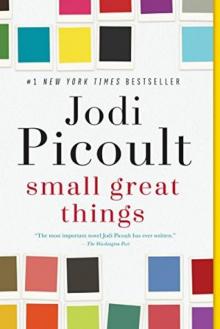 Small Great Things
Small Great Things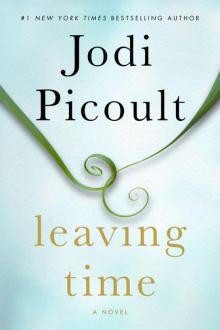 Leaving Time
Leaving Time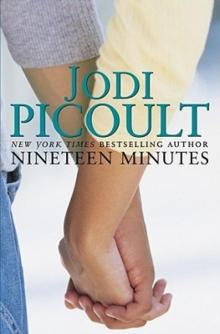 Nineteen Minutes
Nineteen Minutes Larger Than Life
Larger Than Life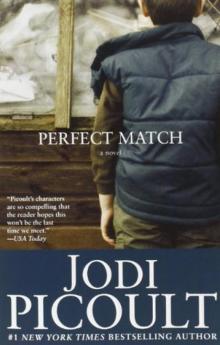 Perfect Match
Perfect Match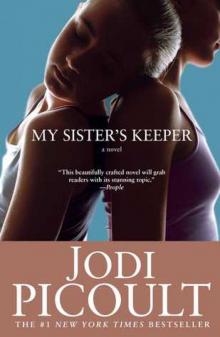 My Sister's Keeper
My Sister's Keeper The Pact
The Pact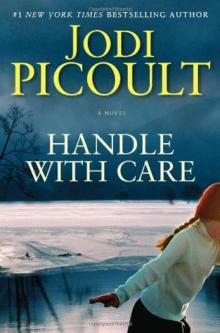 Handle With Care
Handle With Care Songs of the Humpback Whale
Songs of the Humpback Whale Mermaid
Mermaid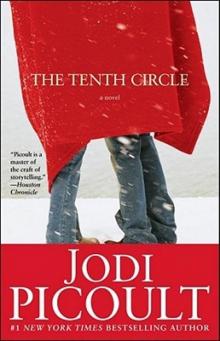 The Tenth Circle
The Tenth Circle The Color War
The Color War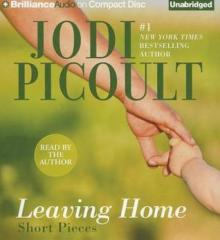 Leaving Home: Short Pieces
Leaving Home: Short Pieces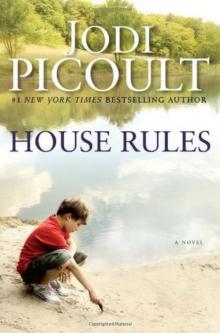 House Rules
House Rules Lone Wolf
Lone Wolf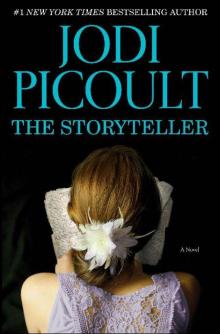 The Storyteller
The Storyteller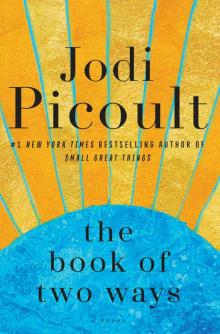 The Book of Two Ways
The Book of Two Ways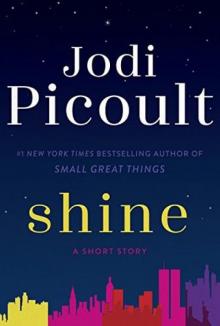 Shine
Shine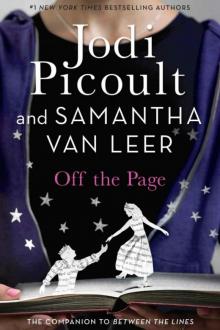 Off the Page
Off the Page Sing You Home
Sing You Home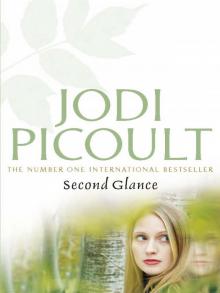 Second Glance: A Novel
Second Glance: A Novel Mercy
Mercy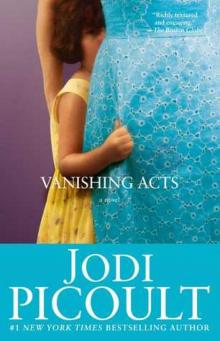 Vanishing Acts
Vanishing Acts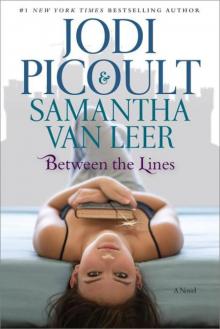 Between the Lines
Between the Lines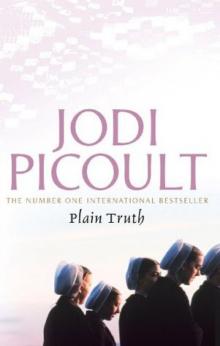 Plain Truth
Plain Truth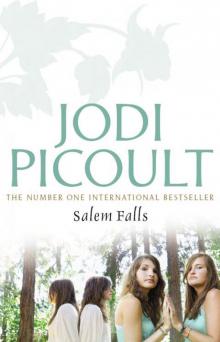 Salem Falls
Salem Falls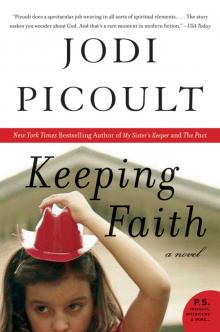 Keeping Faith
Keeping Faith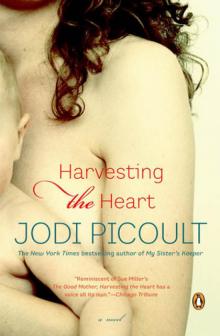 Harvesting the Heart
Harvesting the Heart Change of Heart
Change of Heart Where There's Smoke
Where There's Smoke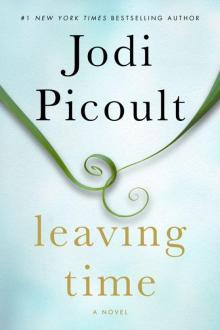 Leaving Time: A Novel
Leaving Time: A Novel Over the Moon
Over the Moon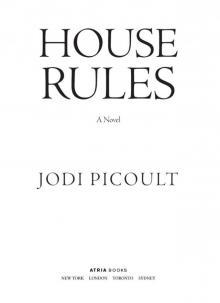 House Rules: A Novel
House Rules: A Novel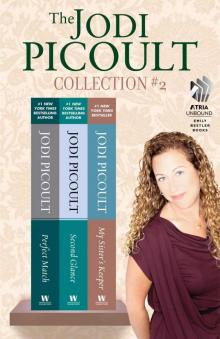 The Jodi Picoult Collection #2
The Jodi Picoult Collection #2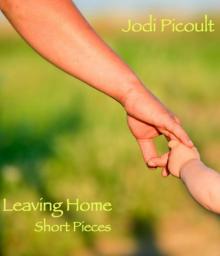 Leaving Home: Short Pieces (Kindle Single)
Leaving Home: Short Pieces (Kindle Single)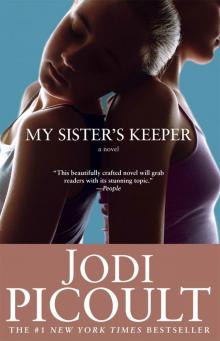 My Sister's Keeper: A Novel
My Sister's Keeper: A Novel![Mermaid [Kindle in Motion] (Kindle Single) Read online](http://i1.bookreadfree.com/i1/04/03/mermaid_kindle_in_motion_kindle_single_preview.jpg) Mermaid [Kindle in Motion] (Kindle Single)
Mermaid [Kindle in Motion] (Kindle Single)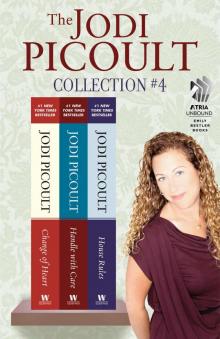 The Jodi Picoult Collection #4
The Jodi Picoult Collection #4 Sing You Home: A Novel
Sing You Home: A Novel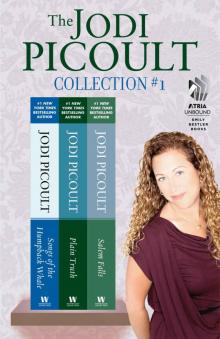 The Jodi Picoult Collection
The Jodi Picoult Collection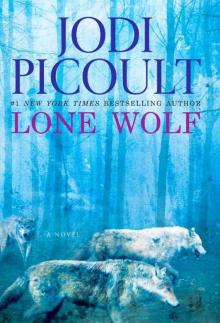 Lone Wolf A Novel
Lone Wolf A Novel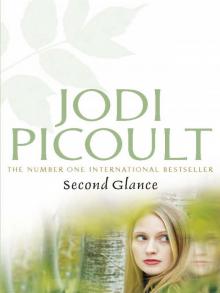 Second Glance
Second Glance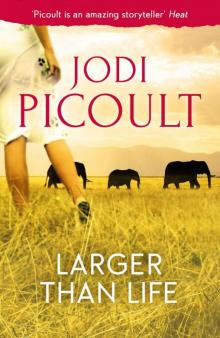 Larger Than Life (Novella)
Larger Than Life (Novella)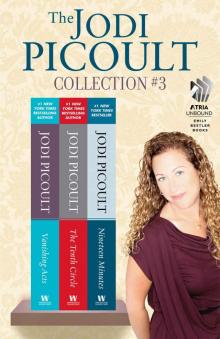 The Jodi Picoult Collection #3
The Jodi Picoult Collection #3